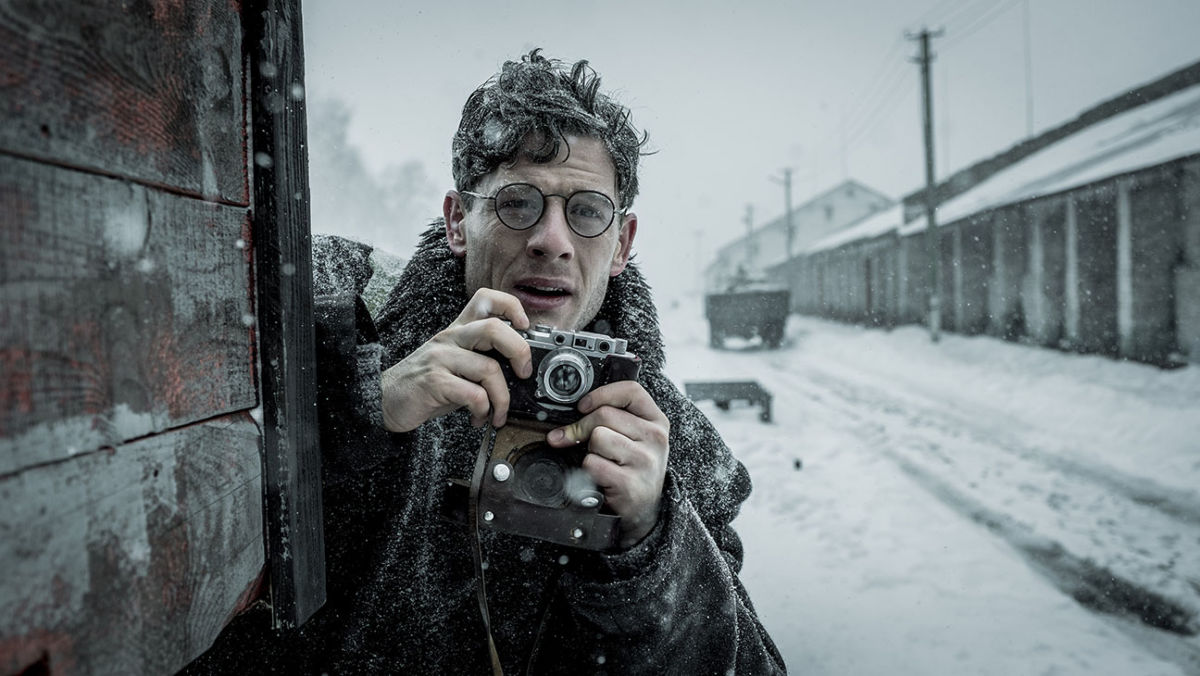Life on a collective farm was supposed to be the dream. If you ever see a Soviet kolkhozy (farm) comedy, they detail the bucolic nature of working in the fields, positing them as a place to discover yourself and find romance. The reality was much different, leading to the deaths of around 5 to 10 million people, the vast majority of which were Ukrainian. Mr Jones does not shy away from this horrific reality, detailing the efforts of the first Western journalist to cover the story. Injecting the biopic with a box of arthouse tricks, Agnieszka Holland’s depiction of this coverage is an intermittently interesting rumination on the duty of journalism that’s ultimately let down by its lethargic pace and on-the-nose conclusions. While undeniable an important film, it lacks any real urgency.
Gareth Jones (James Norton) works as the foreign advisor to Lloyd George (Kenneth Cranham). The film opens in 1933 with Jones in a room heavy with cigar smoke, explaining to the Prime Minister why Hitler — who he interviewed in a plane — needs to be taken seriously. He’s quickly dismissed as a lunatic and later loses his job. His next step: a trip to Moscow to try and discuss Hitler with none other than Stalin himself.
He’s intrigued to see how brilliant the communist project really is, unaware of the brutality of the Stalinist regime. Agnieszka Holland juxtaposes Jones’ train travels to Moscow with clips of Soviet propaganda films, showing the difference between perception and reality. Once he is in the capital (substituted by unconvincing Polish and Ukrainian locations), he is impressed even further by his warm reception at the Hotel Metropol. But Moscow is hiding a secret. Behind the impressive five-year-plan are rumours of deliberate starvation policies in Ukraine. Soon he finds himself on a train to the region, ready to find out the truth for himself.
His main nemesis is not the Soviet government itself, but fellow journalist and Pulitzer Prize winner Walter Duranty (Peter Sarsgaard). The New York Times journalist loves his life in Moscow, cosy-ing up to the regime while holding unspecified sex parties. Believing in the wider appeal of the communist project, he denies that the famine even exists. It’s during these sections that the film really comes into its own, explaining the difficulties journalists may have when reporting in foreign territories. Viciously tell the truth and get burned, or downplay it in euphemism in the pursuit of power?
This journalist angle resonates today. Renowned and respected English language services that report on Moscow from a Russian perspective are limited thanks to the law barring foreign investors from holding more than a 20% stake in Russian media. For example, Meduza works out of Riga while The Moscow Times is now only available online. More investigation of the journalism angle, in all its complications, could’ve made Mr Jones a necessary treatise on the need for a free press.
Instead the effect of the film is lost due to unnecessary devices that distract from the story. As Mr Jones’ stories was the inspiration for George Orwell’s Animal Farm, we are treated to an over-laboured framing device by which the famed writer (Joseph Mawle) types out his own novel. Additionally, Holland lingers on the wrong things, giving us intense, never-ending close-ups just when the film should be ramping up the tension. Jones was a man who needed to tell his story. It doesn’t seem that Holland feels the same.
It’s worth noting here that the famine in Ukraine was part of a wider Soviet famine that wiped out 40% of the Kazakh population and killed millions more in the Caucasus and The Volga Region. By not mentioning this wider context, either in the film itself or by postscript, viewers will be left with the impression that only Ukraine was targeted. This seems quite misguided considering the film’s intention to illuminate one of the worst parts of history. Additionally, Mr Jones’ death — also in postscript — is treated as a definite Soviet murder, when the truth is that no one knows for sure who orchestrated his death. For a film that talks a lot about just sticking to the facts, its selective choices feel rather one-sided.
Some of the coverage you find on Cultured Vultures contains affiliate links, which provide us with small commissions based on purchases made from visiting our site.

